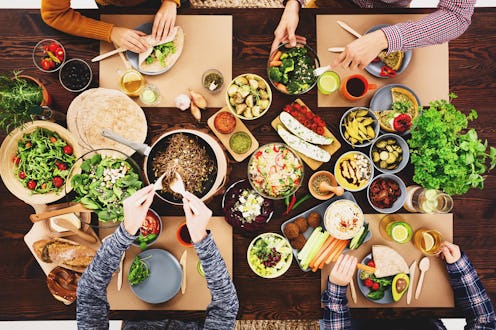Life
What Doctors Want You To Know Before You Go Vegan

If you're thinking of going vegan, you're not alone. A report by Forbes found that the percentage of Americans identifying as vegan rose from 1% in 2014 to 6% in 2017, and that percentage is only set to rise. The Economist called 2019 the "year of the vegan," noting that 25% of all Americans between 25 and 34 say they are either vegan or vegetarian. For those who are considering this lifestyle change, however, going vegan without hurting your health means you need to check in with your doctor before you make the switch.
Vegans don't eat any form of animal products, including meat, dairy, eggs, or sometimes honey. Doctors say that veganism can be a nutritious lifestyle, and may also have some great health benefits, particularly for people who have been eating a lot of processed food.
"By switching to a vegan or vegetarian diet, one would be able to decrease much of the fatty meats and high fat foods that are common in the Western, processed diet," Dr. Gil Weitzman M.D., a New York-based gastroenterologist, tells Bustle. "It would also increase their fiber intake, which has a broad effect on digestive health, the microbiome, and bowel habits, not to mention the overall heart health benefits."
Going vegan is a big dietary change, so it's crucial to talk to your doctor. "Before any major lifestyle change it is important to check in with your healthcare practitioner," Dr. Richard Honaker M.D., a doctor specializing in family medicine at Your Doctors Online, a medical consultation service, tells Bustle. Your diet is relevant to your overall health, so it's important to schedule a meeting with your GP to keep them posted.
While you're at your doctor's, getting tests that measure kidney and liver function and red blood cells can help you plan out your new food habits. "When changing your diet habits from consuming meat and dairy to a vegan diet, it is important to do a full physical," Dr. Honaker tells Bustle. "Checking your blood for any indications of anemia, liver and kidney disease is essential, as a vegan diet may cause issues in those areas."
Anemia is a lack of red blood cells in your blood, and can be caused by deficiencies of iron or other minerals commonly found in animal products, so if you're changing your diet in a way that might impact your mineral levels, you need to be tested for it. If you happen to be anemic and would still like to be vegan, Stanford Medical suggests eating high levels of vegetables with non-heme iron, which is not as easily absorbed as the iron found in meat but is helpful nonetheless. Vegetables with high levels of non-heme iron include avocado, cooked potato, whole wheats, and soy products.
Liver and kidney issues may be more serious impediments to going vegan. While a study of 3,400 people published in the Tzu Chi Medical Journal in 2018 found that vegetarian diets may help some people protect against liver disease, if you already have a liver issue, veganism may be trickier. People with chronic liver disease need high levels of protein in their diets to help maintain liver function, so your diet may need to focus on plant-based protein sources, such as beans, legumes, or soy.
If you have kidney issues such as chronic kidney disease, meanwhile, it's possible to be vegan, according to the National Kidney Foundation — but you need to have medical supervision to make sure that your kidneys continue working. A review of the science around chronic kidney disease and vegetarianism in 2018 found that vegetarianism may be helpful to people with the condition, but that too much protein in a vegetarian or vegan diet can make it worse. A study published in Nutrients in 2019 also found that a long-term vegetarian or vegan diet may protect against the development of chronic kidney disease, so if your family is prone to kidney issues, your doctor may recommend changing your diet.
You should also get your vitamins checked by your doctor before you change your diet to become entirely plant-based. There's a risk, for example, that vegans may not get enough vitamin B12, which can cause palpitations, nerve damage and degeneration of the spinal cord if left untreated for a long period of time. If you have any deficiencies in vitamins like B12 or minerals like calcium, it's a good idea to know before you change your diet, so you and your doctor can design the right food plan to help give you the right nutrients.
Making a big change to veganism may be the best choice for you. It's important to make sure that your body is ready and that there are no issues that might make the transition more difficult — so you're ready to flourish.
Studies referenced:
Chiu, T.H., Lin, M.N., Pan, W.H., Chen, Y.C., Lin, C.L. (2018). Vegetarian diet, food substitution, and nonalcoholic fatty liver. Tzu Chi Medical Journal, 30(2), 102-109. doi: 10.4103/tcmj.tcmj_109_17
Liu, H. W., Tsai, W. H., Liu, J. S., & Kuo, K. L. (2019). Association of Vegetarian Diet with Chronic Kidney Disease. Nutrients, 11(2), 279. doi:10.3390/nu11020279
Gluba-Brzózka, A., Franczyk, B., & Rysz, J. (2017). Vegetarian Diet in Chronic Kidney Disease-A Friend or Foe. Nutrients, 9(4), 374. doi:10.3390/nu9040374
Experts:
This article was originally published on